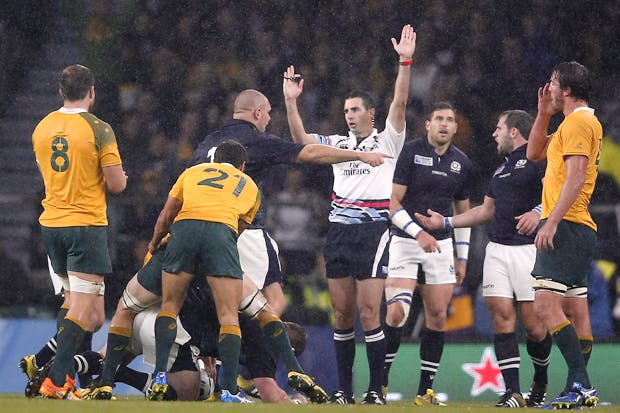The Scots do not know what to do. For once, they have a justified grievance. In recent years, this once-proud nation has been bawling and belly-aching and girning over fictitious complaints to such an extent that Wodehouse’s crack about the ray of sunshine and the Scotsman with a grievance was out of date. It seemed as if all Scotsmen had a grievance at all times.
Tam o’ Shanter’s beldame nursed her wrath to keep it warm. But poor Kate could be forgiven, knowing that her blethering, blustering, drunken blellum of a husband would be getting fou with Souter Johnny. The Scottish Nationalists have neither the justification nor the fun.
Now, everything is different, thanks to Craig Joubert. The match was all but won. It would have been one of the greatest victories in the history of Scottish rugby. Then the referee took leave of his senses.
Could it have been revenge for the Scots’ role in the Boer War? Scottish regiments played a magnificent part in that unnecessary conflict. The Black Watch monument on the Mound in Edinburgh, the numerous memorials in St Giles’: all testify to the glories of imperial Scotland, the courage of her fighting men, the greatness of her regimental tradition. These are moving testaments from the days before Scotland huddled under a burden of false-memory syndrome grievances, while ignoring its real problem: maladminstration by a kail-yard government in a kail-yard parliament.
To judge by his refereeing, Mr Joubert is well suited to a senior post in that Scottish government. But let us leave him to infamy. The other night I had an invitation which it was easy to accept: ‘Come and meet a great rugger player and help us with some claret.’ I thought I had identified the player; a man who looked as if he would be well-suited to the thick of the scrum: looked indeed like Martin Johnson’s brother. But no, that was Reg Clark of Rhino Rugby, an Oxford blue but not an international. This was David Kirk, the victorious New Zealand captain from the first World Cup in 1997. He had come over to cheer on the All Blacks to another championship, which does now look inevitable after the monstrous injustice to Scotland.
Quietly spoken, apparently without an aggressive molecule in his body, David reminded me of a number of friends who served in the SAS and are similarly unobtrusive characters.
Experts say that his supreme skill was captaincy. That All Blacks side had some vastly talented players with equally large egos. Under David’s leadership, they functioned as a harmonious unit: one of the greatest sides ever. Phil Edmonds’s tribute to Mike Brearley would be equally applicable to David: ‘He had a degree in people.’
After winning the World Cup — and captaining Oxford — David became a successful businessman: his approach to rugby had nothing to do with professionalism. In that, he reminded me of a story told by Frans ten Bos, a Scottish rugger international during the Fifties, which evokes the pre-professional — almost pre-lapsarian — ethos. On the Friday night before a Murrayfield match, the team were put up in a hotel. During his brief stay, Frans ordered a paper and made a couple of phone calls. On the Tuesday morning, a missive arrived from the Scottish Rugby Football Union. Frans assumed it would be a thank-you letter. Not so. It ran as follows. ‘Dear ten Bos, It has come to my attention that during your stay at the team hotel, you ordered a copy of the Times newspaper and made two telephone calls. The cost of these transactions was one-and-sixpence-halfpenny. Kindly remit a cheque or postal order for that amount, made out to the SFRU, by return of post.’
We lubricated our rugby talk with 1986 La Fleur-Pétrus, which was in absolutely perfect condition. Itslong finish made it a fine accompaniment to long perspectives on sporting triumphs.
Got something to add? Join the discussion and comment below.
Get 10 issues for just $10
Subscribe to The Spectator Australia today for the next 10 magazine issues, plus full online access, for just $10.















Comments
Don't miss out
Join the conversation with other Spectator Australia readers. Subscribe to leave a comment.
SUBSCRIBEAlready a subscriber? Log in